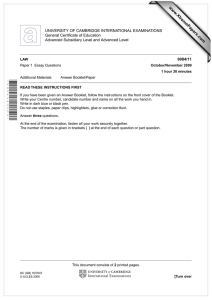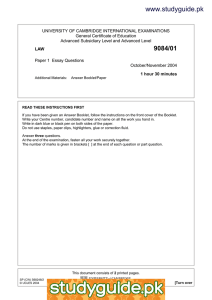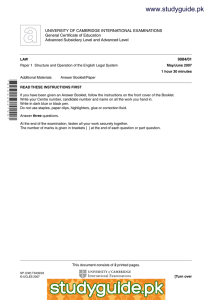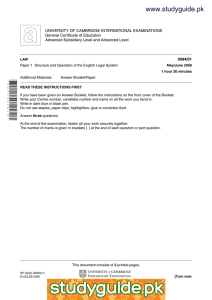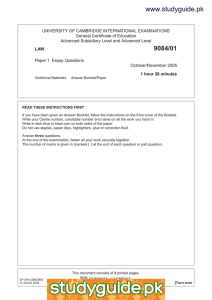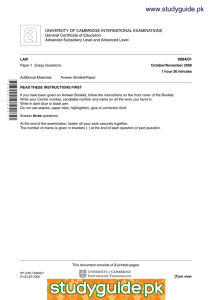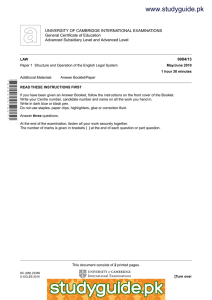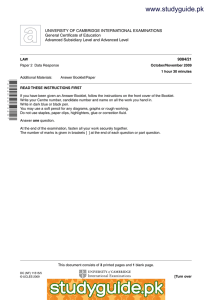www.studyguide.pk
advertisement
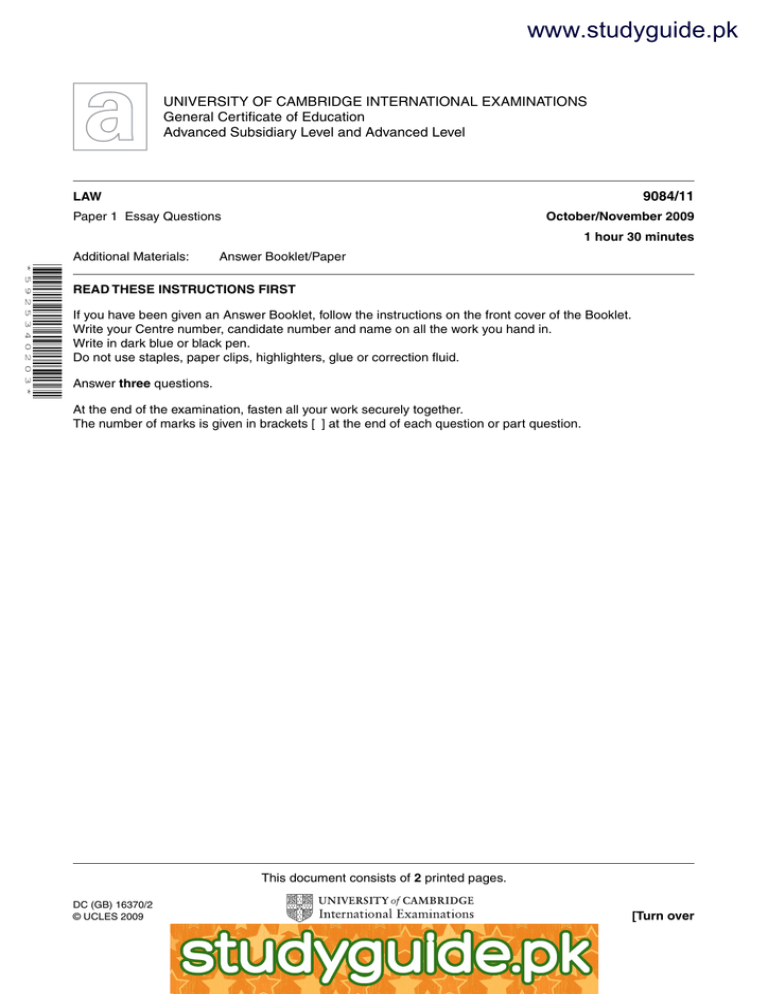
www.studyguide.pk UNIVERSITY OF CAMBRIDGE INTERNATIONAL EXAMINATIONS General Certificate of Education Advanced Subsidiary Level and Advanced Level 9084/11 LAW Paper 1 Essay Questions October/November 2009 1 hour 30 minutes Additional Materials: Answer Booklet/Paper *5925340203* READ THESE INSTRUCTIONS FIRST If you have been given an Answer Booklet, follow the instructions on the front cover of the Booklet. Write your Centre number, candidate number and name on all the work you hand in. Write in dark blue or black pen. Do not use staples, paper clips, highlighters, glue or correction fluid. Answer three questions. At the end of the examination, fasten all your work securely together. The number of marks is given in brackets [ ] at the end of each question or part question. This document consists of 2 printed pages. DC (GB) 16370/2 © UCLES 2009 [Turn over www.xtremepapers.net www.studyguide.pk 2 Answer three questions. 1 Michael has stolen £17 000-worth of computer equipment from his employer. His girlfriend, Jane, has sold the items on the Internet. They have spent the money obtained on a new car and a holiday. Michael pleads guilty to theft and Jane to handling stolen goods at their first appearance before the Magistrates’ Court. What options are open to the magistrates in sentencing them? What principles will be considered by the court in arriving at a sentence? [25] 2 In R v Shivpuri (1987), the House of Lords overruled its earlier decision in Anderton v Ryan (1985). Consider critically the way in which the system of precedent operates in English law and the possibility of overturning a decision which is outdated or unfair. [25] 3 PC Biswas suspects that Pete, who is 16, is carrying drugs. He stops him in the street and tells him to remove his shirt and socks. When the officer discovers a small package of cannabis hidden inside Pete’s left sock, he takes him to the police station. Pete is interviewed alone. PC Biswas tells him: ‘You don’t need a solicitor; they’ll sort it all out at court.’ Pete is then kept in custody, to appear before the Youth Court the next day. To what extent would you say that the powers of the police under the Police and Criminal Evidence Act (1984) have been properly exercised here? [25] 4 Critically evaluate the arguments for and against the use of the jury in civil and criminal proceedings. [25] 5 ‘His Lordship found Section 2 of the Asylum and Immigration Act 2004 ill-drafted but not ambiguous. Nor did the interpretation he would give to it produce an absurdity.’ Thet v Director of Public Prosecutions (2006) Discuss critically the options open to a judge where difficulties arise in the interpretation of a statute. [25] 6 On 1st July 2007, the Health Act 2006 came into force, forbidding smoking in enclosed public spaces. The Smoke-free (Signs) Regulations 2007 took effect from the same date, in the form of a statutory instrument giving details of how and where ‘No Smoking’ signs must be displayed. Discuss the relationship, if any, between statutes and delegated legislation, giving examples of when delegated legislation arises and of the controls which can be exercised over it. [25] Permission to reproduce items where third-party owned material protected by copyright is included has been sought and cleared where possible. Every reasonable effort has been made by the publisher (UCLES) to trace copyright holders, but if any items requiring clearance have unwittingly been included, the publisher will be pleased to make amends at the earliest possible opportunity. University of Cambridge International Examinations is part of the Cambridge Assessment Group. Cambridge Assessment is the brand name of University of Cambridge Local Examinations Syndicate (UCLES), which is itself a department of the University of Cambridge. © UCLES 2009 9084/11/O/N/09 www.xtremepapers.net

